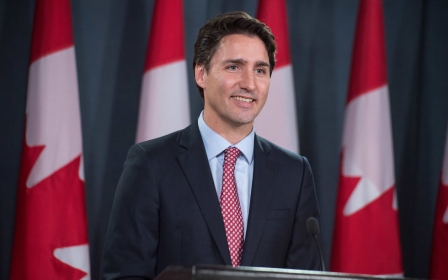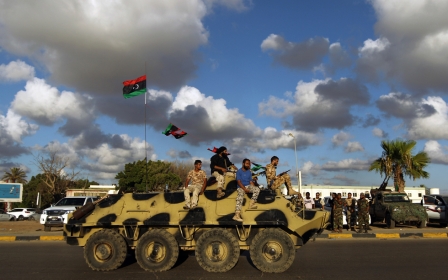Canada urged to cancel controversial torture directive

TORONTO, Canada – Ottawa is facing questions about why a controversial ministerial directive allowing the Canadian intelligence agency to use and share information obtained through torture remains in place.
The criticism re-surfaced this week in response to a series of CBC reports about the role Canadian intelligence and police agencies played in the torture of Canadian citizens imprisoned in Syria between 2001 and 2004.
“The ministerial directions violate our international human rights obligations and we’ve been calling them for them to be rescinded for many years now,” said Alex Neve, executive director of Amnesty International Canada.
Neve told Middle East Eye that “it’s disappointing and troubling” that one year into the tenure of Prime Minister Justin Trudeau’s new Liberal government, there have not been any signs that the directives will be rescinded.
“The fact that it is limited to exceptional circumstances is no defence,” Neve said. “There is never in any circumstance any excuse for torture. There’s no such thing as exceptional circumstances when it comes to torture.”
Sharing information derived from torture
In 2010, Canada’s former Public Safety Minister Vic Toews sent new directives to the Canadian spy agency, the Canadian Security Intelligence Service (CSIS), giving it the power to use and share information believed to have been obtained through torture.
The directive instructed CSIS that in “exceptional circumstances” where public safety and lives are at risk, it could “share the most complete information available at the time with relevant authorities, including information based on intelligence provided by foreign agencies that may have been derived from the use of torture or mistreatment".
Ignoring the information because of where it came from – and amid fears it was gleaned through torture – constitutes “an unacceptable risk to public safety,” the directive stated.
Documents obtained by the CBC showed how CSIS and Canada’s federal police service, the Royal Canadian Mounted Police (RCMP), shared information with Syrian officials involved in the interrogation, detention and torture of three Canadians.
Abdullah Almalki, Ahmad Elmaati and Muayyed Nureddin have each filed $100 million lawsuits against the government for its alleged involvement in their torture while they were imprisoned in Syria. The cases are expected to continue early next year.
According to CBC reports released earlier this week, the RCMP put Almalki, a Canadian electrical engineer and businessman born in Syria, under 24-hour surveillance on suspicions he had ties to terrorism.
But despite not establishing anything concrete on him, the RCMP put out a worldwide terrorist alert on Almalki and shared information about him with the Syrian authorities, the CBC found.
Almalki was arrested at Damascus airport in 2002 while attempting to visit his ill grandmother, and he was beaten and abused in detention in Syria.
“Instead of pressing Syria for the release of Almalki, documents show Canada's ambassador to Damascus, Franco Pillarella, arranged for the RCMP’s questions to be hand-delivered to the Syrian agency that was responsible for torturing him,” the CBC reported.
‘Determined to keep Canadians safe’
The CBC reported that Ralph Goodale, Canada’s current Public Safety Minister, has the power to cancel the ministerial directive. The minister told the public broadcaster that he “continues to assess ministerial directives to ensure that they both protect our rights and freedoms, and keep Canadians safe”.
Asked to comment on why the directive remains on the books, ministry spokesperson Scott Bardsley referred Middle East Eye to comments Goodale made in parliament earlier this week.
In the House of Commons, Goodale said a recently-tabled government bill – Bill C-22, which would establish a parliamentary committee to review national security and intelligence policies – would address longstanding recommendations for Canada to subject its security agencies to added scrutiny.
“More broadly, the fact is that the entire national security framework is under review. We are consulting Canadians; more than 7,000 are already participating in that process. We are determined to keep Canadians safe,” Goodale said.
Neve said Goodale has indicated that he’s looking into, and is concerned by, the issue, but he said Amnesty would “like to see some progress quite quickly” on cancelling the ministerial directives.
Neve underlined that the revelations made this week about the Almalki, Elmaati and Nureddin cases “very starkly underscore why those ministerial directives do need to be rescinded”.
“We saw information heading out of Canada, off to Syria, that was used in interrogation sessions that involved torture, and we know that information that came out of those interrogation sessions in turn found its way back to Canada and was used and relied upon by our security agencies in various ways,” he said.
“So there’s a perfect example in those three cases of what’s wrong with these ministerial directions, and a pretty chilling reminder that it’s not just about what’s going to happen to foreign nationals - that in a very perverse way, these ministerial directions can have direct implications for Canadians themselves.”
Middle East Eye propose une couverture et une analyse indépendantes et incomparables du Moyen-Orient, de l’Afrique du Nord et d’autres régions du monde. Pour en savoir plus sur la reprise de ce contenu et les frais qui s’appliquent, veuillez remplir ce formulaire [en anglais]. Pour en savoir plus sur MEE, cliquez ici [en anglais].




